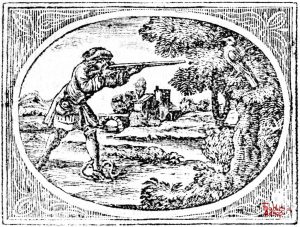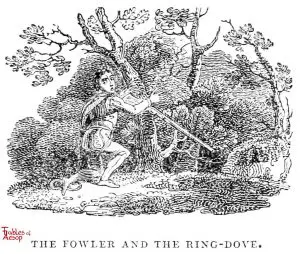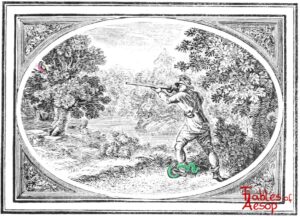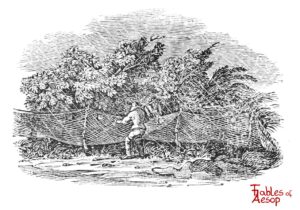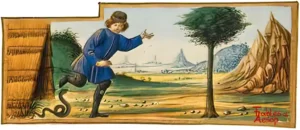A man walking and concentrating accidentally stepped on a viper which bit him.
Concentrate on one thing to the exclusion of others at your own peril.
[These versions are similar enough to be included on the same page.]

Townsend version
A fowler, taking his bird-lime and his twigs, went out to catch birds. Seeing a thrush sitting upon a tree, he wished to take it, and fitting his twigs to a proper length, watched intently, having his whole thoughts directed towards the sky. While thus looking upwards, he unknowingly trod upon a Viper asleep just before his feet. The Viper, turning about, stung him, and falling into a swoon, the man said to himself, “Woe is me! that while I purposed to hunt another, I am myself fallen unawares into the snares of death.”

JBR Collection (The Fowler and The Ring-Dove)
A Fowler, seeing a Ring-Dove among the branches of an oak, put his piece to his shoulder and aimed at the bird. Just then an Adder, on which unknowingly he had trodden, bit him in the leg. Feeling the poison spreading in his veins, he threw down his gun, and exclaimed, “Fate has justly brought destruction on me while I was contriving the death of another!”

Samuel Croxall (The Fowler and the Ringdove)
A FOWLER took his gun, and went into the woods a shooting. He spied a Ringdove among the branches of an oak, and intended to kill it. He clapped the piece to his shoulder, and took his aim accordingly. But, just as he was going to pull the trigger, an adder, which he had trod upon under the grass, stung him so painfully in the leg, that he was forced to quit his design, and threw his gun down in a passion. The poison immediately infected his blood, and his whole body began to mortify; which, when he perceived, he could not help owning it to be just. Fate, says he, has brought destruction upon me, while I was contriving the death of another.
THE APPLICATION
This is another lesson against injustice; a topic in which our just author abounds. And, if we consider the matter fairly, we must allow it to be as reasonable that some one should do violence to us, as we should commit it upon another. When we are impartial in our reflections, thus we must always think. The unjust man, with a hardened, unfeeling heart, can do a thousand bitter things to others; but if a single calamity touches himself, oh, how tender he is! How insupportable is the uneasiness it occasions! Why, should we think others born to hard treatment more than ourselves? or imagine it can be reasonable to do to another, what we ourselves should be unwilling to suffer! In our behaviour to all mankind, we need only ask ourselves these plain questions, and our consciences will tell us how to act. Conscience, like a good, valuable domestic, plays the remembrancer to us upon all occasions, and gives us a gentle twitch, when we are going to do a wrong thing. It does not, like the adder in the fable, bite us to death, but only gives us kind cautions. However, if we neglect these just and frequent warnings, and continue in a course of wickedness and injustice, do not let us be surprised if Providence thinks lit, at last, to give us a home sting, and to exercise a little retaliation upon us.

Thomas Bewick (The Fowler and The Ring-Dove)
A Fowler took his gun, and went into the woods ashooting. He spied a Ring-dove among the branches of an Oak, and clapping the piece to his shoulder, took his aim, and made himself sure of killing it. But just as he was going to pull the trigger, an Adder, which he had trod upon under the grass, bit him so painfully in the leg, that he was obliged to quit his design, and throw his gun down in an agony. The venom immediately infected his blood, and his whole body began to mortify; which, when he perceived, he could not help owning it to be just. Fate, says he, has brought destruction upon me, while I was contriving the death of another.
APPLICATION.
The mischief that bad men meditate to others, commonly, like a judgment, falls upon their own heads; and the punishment of wickedness is so just in itself, that the sufferer, who has made others feel it, cannot, if he think rightly, but confess that he deserves the like inflicted on himself. The hardened unfeeling heart of a cruel and unjust man, can, however, continue to do a thousand bitter things to others, until he tastes calamity himself, and then only it is that he feels the insupportable uneasiness it occasions. Why should we think others born to hard treatment more than ourselves, or imagine it can be reasonable to do to another what we should think very hard to suffer in our own persons?

L’Estrange version (A Fowler and A Pigeon)
As a country fellow was making a shoot at a pigeon, he trod upon a snake that bit him by the leg. The surprize startled him, and away flew the bird.
Moral
We are to distinguish betwixt the benefits of good will, and those of providence: for the latter are immediately from heaven, where no human intention intervenes.

Gherardo Image from 1480

Vipera et Auceps
Venator quidam, sumpto visco et harundinibus, venatum exiit. Cum autem turdum procera in arbore considentem vidisset, calamis inter se in longitudinem iunctis, oculos ad eum levabat, ipsum capere exoptans. Interim vero contigit ut viperam, sub pedibus iacentem, nescius premeret. Quae cum exasperata ipsum mormordisset, iamiam ille deficiens, “Me miserum,” inquit, “qui cum alium venari vellem, ab alio ad mortem raptus sum.”
Perry #115
